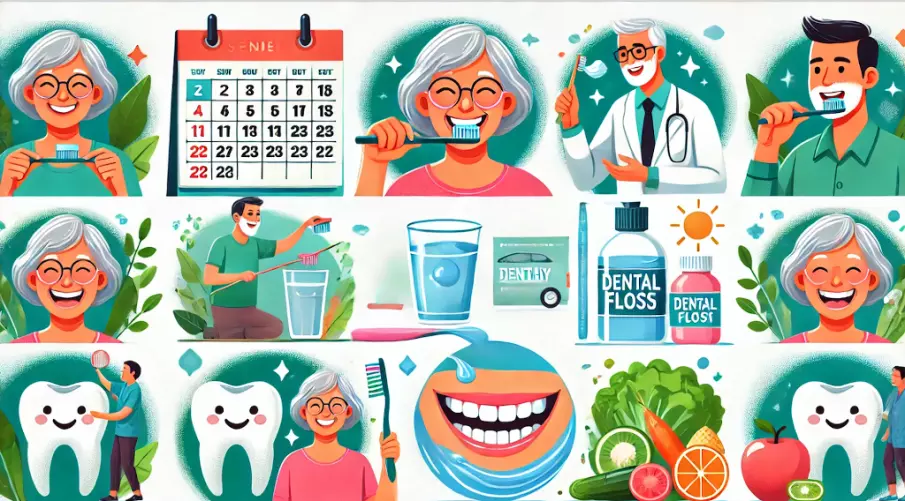Dr. Daniel Larscheid's Oral Hygiene Tips for Seniors: Maintaining Healthy Teeth and Gums
As we age, maintaining oral health becomes increasingly crucial for overall well-being. Dr. Daniel Larscheid, a seasoned dentist with over two decades of experience, shares valuable insights and practical tips to help seniors keep their teeth and gums healthy. By following these guidelines, seniors can prevent common dental issues and enjoy a confident, pain-free smile.

The Importance of Oral Hygiene for Seniors
Oral health is closely linked to overall health. Poor dental hygiene can lead to various issues, including gum disease, tooth decay, and even systemic conditions like heart disease and diabetes. According to the Centers for Disease Control and Prevention (CDC), nearly 68% of adults aged 65 and older have gum disease, and about 20% have untreated tooth decay. Maintaining good oral hygiene can significantly reduce these risks.
Tips for Effective Oral Hygiene
- Brush Twice Daily
- Use a soft-bristled toothbrush to avoid damaging the gums.
- Opt for fluoride toothpaste to strengthen enamel and prevent cavities.
- Brush for at least two minutes, covering all surfaces of the teeth.
- Replace your toothbrush every three to four months or sooner if the bristles are frayed.
- Floss Daily
- Flossing removes plaque and food particles between teeth that brushing misses.
- Use a gentle sawing motion and avoid snapping the floss against the gums.
- For those with dexterity issues, consider using floss picks or water flossers.
- Use Antibacterial Mouthwash
- An antibacterial mouthwash can help reduce plaque, prevent gum disease, and freshen breath.
- Rinse once or twice a day, as directed on the product label.
- Stay Hydrated
- Dry mouth is common in seniors, often due to medications. It can lead to tooth decay and gum disease.
- Drink plenty of water and consider using saliva substitutes or sugar-free gum to stimulate saliva production.
- Eat a Balanced Diet
- A diet rich in vitamins and minerals supports oral health.
- Include foods high in calcium and vitamin D to strengthen teeth and bones.
- Limit sugary snacks and drinks, which can lead to tooth decay.
- Regular Dental Check-Ups
- Visit your dentist every six months for a professional cleaning and check-up.
- Regular visits can detect issues early and prevent more serious problems.
- Dr. Larscheid emphasizes that seniors should not skip dental visits, even if they have dentures or implants.
Common Oral Health Issues in Seniors
- Gum Disease
- Caused by plaque buildup, leading to inflammation and infection of the gums.
- Symptoms include red, swollen, and bleeding gums.
- Advanced gum disease (periodontitis) can cause tooth loss.
- Tooth Decay
- Seniors are at higher risk for cavities due to receding gums and dry mouth.
- Regular brushing, flossing, and fluoride treatments can help prevent decay.
- Tooth Sensitivity
- Thinning enamel and receding gums expose sensitive areas of the teeth.
- Use toothpaste designed for sensitive teeth and avoid extremely hot or cold foods and drinks.
- Oral Cancer
- Oral cancer risk increases with age. Symptoms include sores, lumps, and difficulty swallowing.
- Regular dental check-ups include screenings for oral cancer.
Dental Care for Denture Wearers
- Clean Dentures Daily
- Remove and rinse dentures after eating.
- Brush dentures with a soft-bristled brush and non-abrasive cleanser daily.
- Soak dentures in a mild solution overnight to keep them moist and free from bacteria.
- Maintain Oral Hygiene
- Clean your gums, tongue, and roof of your mouth daily with a soft-bristled brush.
- Schedule regular dental visits to check the fit of your dentures and oral health.
Statistics Highlighting the Importance of Senior Oral Health
- According to the American Dental Association (ADA), nearly 75% of seniors aged 65 and older retain some of their natural teeth.
- The National Institute of Dental and Craniofacial Research (NIDCR) reports that 25% of seniors aged 65-74 have severe periodontal disease.
- The CDC states that seniors with poor oral health are more likely to suffer from chronic conditions such as diabetes and heart disease.
Conclusion
Maintaining oral health is vital for seniors to enjoy a high quality of life. Dr. Daniel Larscheid's tips provide a comprehensive guide to help seniors take control of their dental health. By following these practices, seniors can prevent common dental issues, ensuring their teeth and gums remain healthy. Regular dental visits, combined with good daily habits, will help seniors maintain their smiles and overall well-being.
For more information and to schedule a consultation, visit Dr. Larscheid's website. You can also follow Dr. Daniel on LinkedIn, Instagram, and other social media platforms. Dr. Larscheid and his team are dedicated to providing personalized care to help seniors achieve optimal oral health.
More to Read:
Previous Posts:





